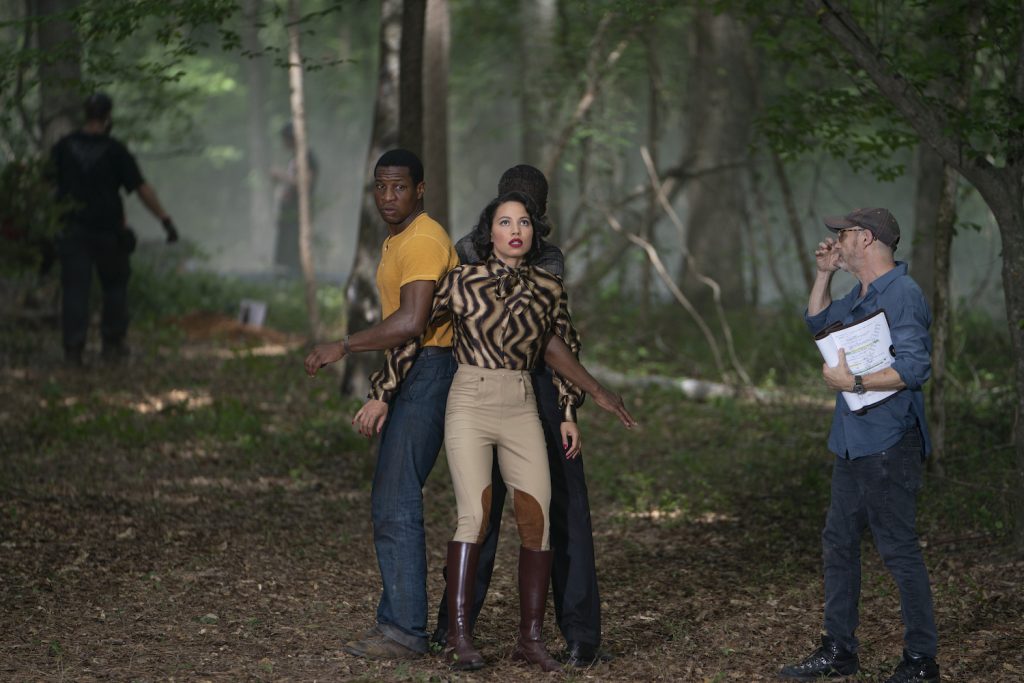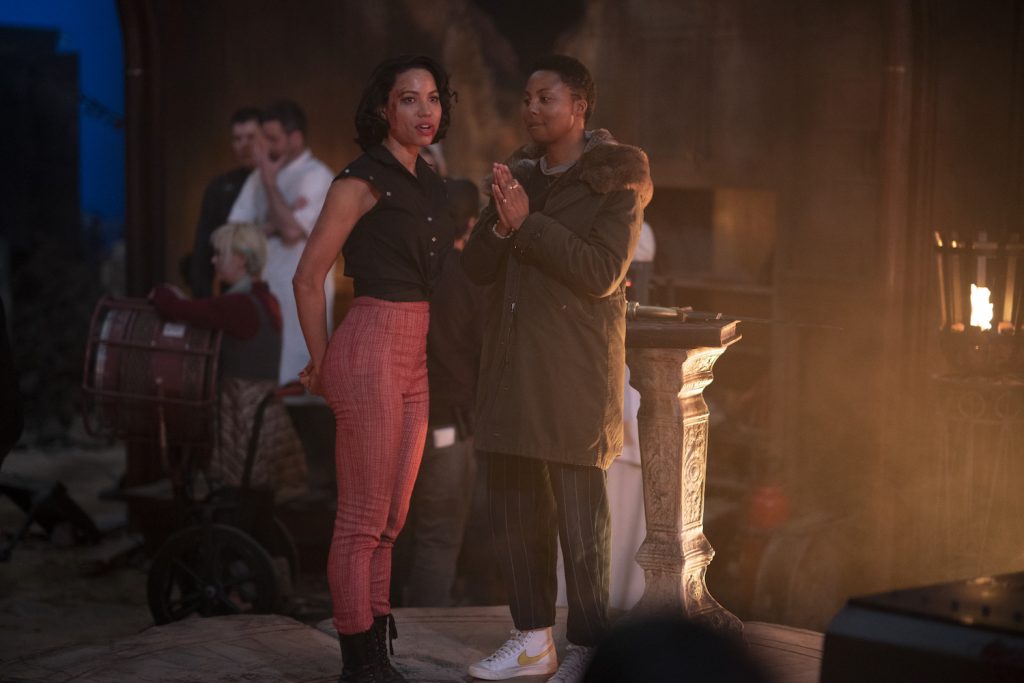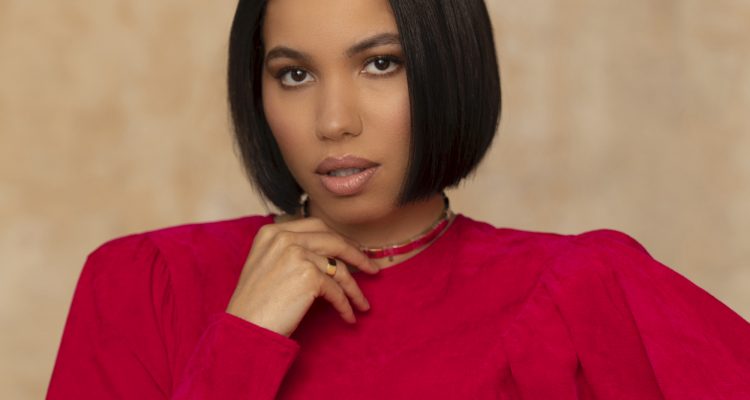“With Lovecraft Country, the exhaustion was there yet I felt energized everyday too,” Jurnee Smollett explains. “That’s just the artist’s brain, that we’re wired to be in that cycle. One feeds the other; the exhaustion feeds the energy.”
Following her scene-stealing turn in WB & DC’s Birds of Prey at the beginning of 2020, Smollett gave one of the year’s best performances in HBO’s supernatural series Lovecraft Country.
The Emmy nominated actress, whose resume ranges from Eve’s Bayou, Full House and Friday Night Lights, was reunited with Lovecraft Country creator Misha Green, whom she previously worked with on WGN America’s Underground.
Based on the novel by Matt Ruff of the same name, Jurnee Smollett stars as Letitia ‘Leti’ Lewis, a young African-American woman traveling with her companions Atticus ‘Tic’ Freeman (Jonathan Majors) and his uncle George (Courtney B. Vance) during the Jim Crow era in search of Tic’s father Montrose Freeman (Michael K. Williams). Their journey is interrupted by encounters vicious beasts and occult activities through a segregated 1950s America.
The limited series flipped the script on H.P. Lovecraft’s noted bigotry, blending science-fiction, fantasy and adventure that contrasts juggernaut monsters with white supremacist cops, and reclaims the power stolen from African-Americans. Smollett drew on her Grandmother’s experience growing up in that time, understanding the strength it took for a black woman to even step outside her home.
Smollett spoke with Awards Focus about creating wordless moments with co-star Jonathan Majors, her thoughts on Lovecraft Country not getting picked up for a second season, and the changes she’s seen in the industry as a board member for the TimesUp Movement.
Awards Focus: Were you surprised Lovecraft Country didn’t get picked up for a second season?
Jurnee Smollett: Being in this industry, not a lot surprises. I’ve done it long enough to go with the flow of it. So much of it is out of our control as actors, especially when you’re not a producer or part of the creative team.
AF: What went through your mind when you read the second episode where Leti dies and comes back to life?
Smollett: Misha had been telling me that my character was going to die, but that Leti wasn’t actually getting killed off.It’s such a massive part of Leti’s trajectory that she experiences an afterlife. She’s brought back to life and the grief that we witness where Leti is on the bathroom floor is a real purging.
But it doesn’t stop there and continues throughout the show. We see it manifest in her quest for life. To feel things, to find a calling, to find a relationship with the ultimate parent, God. Her need to feel is very primal. I mean, she loses her virginity too. It was very important for me to analyze this important moment for Leti, and how it propels her into the direction.

AF: That moment where Leti dances with another guy at the housewarming party in episode three while staring at Atticus was incredibly loaded. What were the conversations surrounding that moment for Leti and ensuring she had ownership of her body and choice?
Smollett: What’s interesting is the archetype of ladies we were working with early on were the Virgin Gods. But not in the sense of the way we now, in 2021, but the classic archetype of this woman who was very much self-assured in her sexuality.
Leti chooses things on her terms. She has such a wall up with many people in her life, which we see with her sister, from her abandonment issues with her mother, and then Atticus comes along. For the first time in her life she has this real hunger for attachment, for connection. Their world is turned upside down when they discover magic exists and the trauma bonds them. We talked about their souls tied forever, and part of that is the consummation, which for her is the need to feel that intimacy with someone she’s bound to.
Another thing we talked about is the need to feel the consent. Atticus keeps pushing her away, and avoiding her. There’s the scene in the basement when she tries to touch his hand, and he walks away. It’s all setting the seeds in which she’s hungry for this connection, and it’s displayed on the dance floor when she’s eye-fucking him.
AF: It’s beautifully captured and performed because we know what they’re both thinking without words highlighting the moment.
Smollett: Some of my favorite moments with Jonathan are the ones that are wordless. Like in episode two when he runs out of the house, the ashes are falling everywhere, and Leti runs up to him and they just look at each other. In that moment she knows that what he is telling her is about Uncle George.
AF: Was it a cathartic experience to draw on your grandmother’s life as inspiration for Leti?
Smollett: This entire project is very ancestral. We’ve talked about this idea of blood memory. Particularly with my grandmother, just understanding the real courage that it took to just be your whole self, being a black woman in 1955, Jim Crow America. My mother is black. I’m a black woman. My father was Jewish. I come from folks who have suffered and yet I feel that strength in my blood, and it’s a humbling experience.
I gained so much reverence and a deeper respect than I already had, and I never met her. My admiration for her only deepened in playing Leti, and understanding that the second you step outside your house, your entire existence is in danger. What does it do to the person that says no, I have the audacity to actually live my life?
You feel rage in moments, and you feel sorrow, but you’re at least feeling. We literally go to the ancestral plane in episode ten, and to step back and really meditate on the fact that my very existence was enabled by someone choosing to survive over again every day, every month, made me be able to be who I am today.
AF: Lovecraft Country had a grueling eight month production. How were you and the rest of the cast able to keep from getting overwhelmed?
Smollett: It was this real cycle. Every night you’d go home after working a 17 hour day. I was nursing my son full-time and I can’t imagine a time I was more exhausted. But that’s the joy in life. It’s like the George Bernard Shaw quote, that the true joy in life is being used for a purpose. I want to be worn out! I want to feel that I’ve given every single ounce of my mind, my body and my spirit.
With Lovecraft Country, the exhaustion was there, yet I felt energized everyday too. I would wake up so excited to go back and do it all over again. That’s just the artist’s brain, that we’re wired to be in that cycle. One feeds the other; the exhaustion feeds the energy.

AF: You’re also on the board of the Time’s Up Movement. What kind’s of changes have you seen since you started in the industry?
Smollett: That’s a great question. Lovecraft Country was the first project I did post my involvement with Time’s Up and the MeToo movement. I saw a real change on the ground instantly because the amount of folks behind the camera that were black and brown, and women of all kinds represented, just felt so inclusive.
I also felt safe enough to be heard. Nudity was something that I never felt was needed in projects before Lovecraft Country. But Misha (Green) called me before I signed on, and she said I want you to know that I will not ask of you anything that I feel I can’t also keep you safe while doing.
There was an instance in which there was an issue that was not okay. She decided not to move forward with the scene because she couldn’t guarantee our safety as there were too many factors. There was a spirit of awareness in the atmosphere that was completely supported by JJ (Abrams). Yes, we have a long way to go, but I’m seeing it happen.
AF: Given your involvement in the movement, what do you envision for the future?
Smollett: One of the things that I feel blessed to have gained since being a part of TimesUp is this feeling of sisterhood, of feeling less alone. You’ve thought for so long that it was just you going through some of these issues, that it was just you on set dealing with a jerk, and now we realize that we were divided and isolated for so long.
Here’s the thing, the goal is not gender specific. It’s about creating a fair, safe and dignified workplace for all of us. What can we image? How big can we imagine a new world? What could be the new normal?
I think it can be quite beautiful, and it can be empowering for all of us.


